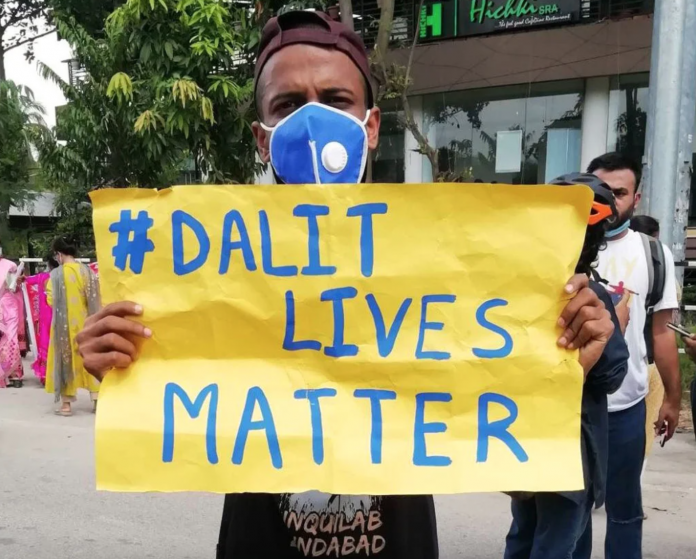
Caste-ing Space raises serious questions about the prevalence of caste in social spaces and underlies crucial concerns in anti-caste circles.
Muhammed Nihad PV | TwoCircles.net
KERALA — A new documentary film on the prevalence of caste in social spaces has sparked a fresh debate on how caste notions are reproduced across different mediums.
Made by two young budding filmmakers Basil Islam and Thoufeeq K, the documentary, produced by Students Islamic Organisation (SIO), Kerala and Campus Alive, an online magazine, was released last week at a public event in Kozhikode.
Islam is a sociology graduate from Jamia Milia Islamia and Thoufeeq is a photographer and filmmaker.
“The writers, social workers and NGOs who speak about manual scavenging and the problem of caste, I think they don’t do it as a political act; they make it a pitying act. They say, ‘Oh! The Dalit women, they are carrying shit on their heads, we have to stop that practice’, okay, what’s next? After ten years, they say ‘people are entering into a manhole; we have to stop the practice.’ Who knows, after ten years, what is going to come? But if you oppose it as a political act, you will find a root to it. When you attack the root, you attack everything and the key to that is the act of politicising the spaces.” It is from this fundamental question raised by Raees Muhammad, the founder of Dalit Camera and a committed anti-caste activist, that the documentary film “Caste-ing Space” takes shape. When the mainstream initiatives in understanding and opposing caste are often limited to its mere manifestations the debut directorial endeavour of Islam and Thoufeeq strikes at the root of the problem, which is the spaces that reproduce the notions of caste in different forms across different times.
The 30-minute film is divided into three chapters: permanence, architecture and conversion.
The directors navigate how the ideas of purity and pollution are permanently embedded in caste bodies, and how spaces facilitate the divide between permanently pure upper caste bodies and permanently impure Dalits.
The film highlights that even if an individual born to a caste of scavengers takes up other vocations or gets into bureaucracy, he is forever identified with scavenging and hence impure.
The film also throws light on how social order is replicated in the architecture of society. Caste being the deciding factor of the Indian social order restricts the access of Dalits to various avenues of public space including temples, houses and even toilets.
The film examines the role of religious conversion in aiding the mobility of lower castes. Quoting Ambedkar, Raees Muhammed argues that since caste is intrinsic to Hinduism, any attempt to annihilate the menace or community emancipation is meaningless.
Invoking Periyar’s proposition who had suggested Ambedkar to choose Islam as a religion for emancipation since it provides a good cure to humiliation and oppression, Mohammad claims that at present, Islam is the only solution to bypass the vicious cycle of the caste system.
While Hindu temples excluded toilets and denied the entry of lower castes, mosques provided a congregational space of self-respect and revolutionised their premises by including toilets.
Apart from this architectural and structural distinction, the film looks at conversion as a wholesome ideological shift. The mass conversion of Dalits to Islam after the collapse of the caste wall and the subsequent death of 17 people in Mettupalayam of Tamilnadu is taken as a reference. The lives taken by the wall were forgotten and it was rebuilt by the perpetrators but the dynamics had changed. The wall erected to segregate upper-caste settlements from the Dalit population restricted not only their visibility and mobility but also their vision and will. But the conversion, as the new Muslims of Mettupalayam say, helped them transcend the wall of slavery and brought them a new life of freedom. With beards, skull caps and hijabs they are new individuals with a new identity. They speak a new language and address each other as bhais (brothers). They fearlessly enter places earlier forbidden for them. Above all, a new community with dignity is born. It was this Mettupalayam incident that inspired B. Ravichandran to embrace Islam and become Raees Muhammed.
“Raees Muhammed is a person who has given a new meaning to anti-caste activism,” said Basil Islam, co-director of the film. “We attempted to amplify his ideas through this film. This is the first step. What remains beyond the frames is huge and untouched.”
For Thoufeeq K, the co-director of the film, the making of this film was a learning experience. “The one-year journey has triggered several serious thoughts both about the social realities as well as the role of filmmaking,” he told TwoCircles.net.
Muhammad Nihad PV is a sociology student at the University of Hyderabad. He tweets at @nihadbinnisar
